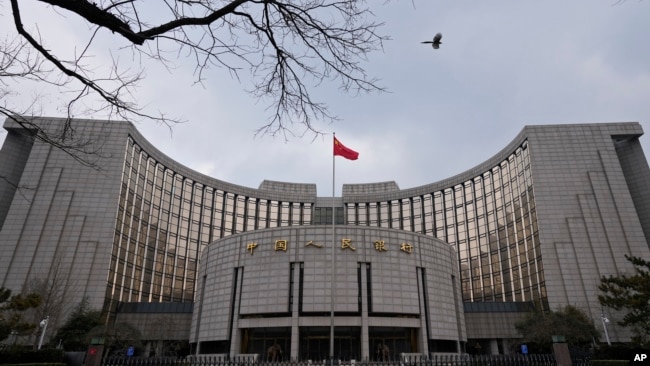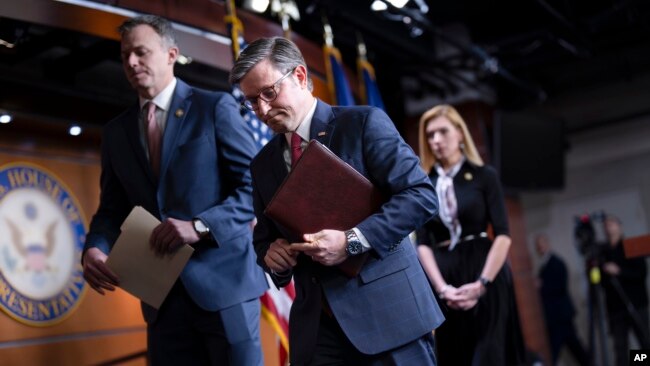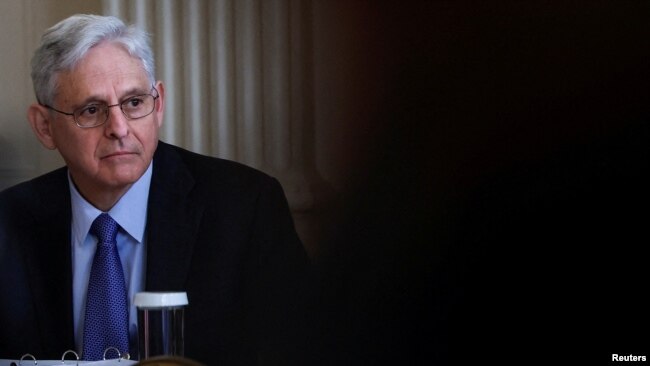무디스, 중국 부채 전망 '부정적'으로 변경
Moody's Changes Outlook for China's Debt to 'Negative'
페이지 정보
작성자 Rob Garver 작성일 23-12-05 06:47 댓글 0본문

파일 - 2022년 1월 20일 베이징 중국 중앙은행 앞에 국기가 게양됩니다. 신용평가사 무디스는 중국 정부 신용등급 전망을 안정적에서 부정적으로 낮췄습니다
FILE - The national flag flies in front of China's central bank in Beijing, Jan. 20, 2022. Ratings agency Moody's cut its outlook on China's government credit ratings to negative from stable, Dec. 5, 2023.
중국 경제의 지속 불가능한 부채 수준에 대한 우려가 높아지면서 화요일 주요 신용 평가 회사는 중국의 국가 부채에 대한 전망을 부정적으로 바꿨다고 발표했습니다.
As worries mount about unsustainable levels of debt in the Chinese economy, a major ratings firm on Tuesday announced that it has changed its outlook for China's sovereign debt to negative.
무디스는 지방정부와 지방정부의 높은 수준의 부채가 지급액을 유동적으로 유지하는 데 어려움을 겪고 있어 중국 정부가 재정 지원에 나서야 할 것으로 예상된다고 경고했습니다.
Moody's Investors Service warned that high levels of debt among regional and local governments, many of which are struggling to remain current on their payments, is expected to force the Chinese government to step in with financial assistance.
중국 경제가 비틀거리고 성장률도 예상보다 낮은 상황에서 무디스는 이렇게 추가된 부담이 정부에 재정 압박으로 작용할 수 있다고 경고했습니다.
At a time when the Chinese economy is stumbling and growth rates are lower than expected, Moody's warned that this added burden could put fiscal pressure on the government.
"부정적인 전망으로의 변화는 재정적으로 강조되는 지역 및 지방 정부와 국유 기업에 대해 정부 및 더 넓은 공공 부문에서 재정 지원이 제공될 것이라는 증거가 증가함을 반영하며, 이는 중국의 재정, 경제 및 제도적 강점에 광범위한 하방 위험을 초래합니다."라고 기관은 보도 자료에서 말했습니다.
"The change to a negative outlook reflects rising evidence that financial support will be provided by the government and wider public sector to financially stressed regional and local governments and State-Owned Enterprises, posing broad downside risks to China's fiscal, economic and institutional strength," the agency said in a press release.
"이번 전망 변화는 구조적으로 그리고 지속적으로 낮은 중기 경제성장률과 관련된 위험 증가와 부동산 부문의 지속적인 축소를 반영한 것이기도 합니다."
"The outlook change also reflects the increased risks related to structurally and persistently lower medium-term economic growth and the ongoing downsizing of the property sector."
현재 등급 변동 없음
Current rating unchanged
발표에서 무디스는 현재 중국 등급이 A1으로 AAA의 최고 등급보다 몇 단계 낮지만 여전히 "투자 등급" 부채로 간주되는 가운데 있다고 단언했습니다. 미국은 무디스로부터 최고 등급보다 한 단계 낮은 Aa1 등급을 받았습니다.
In its announcement, Moody's affirmed that its current rating of China remains A1, several notches below the top level of Aaa, but still in the middle of what the agency considers "investment grade" debt. The United States is rated Aa1 by Moody's, one step below the top rating.
중국 재정부는 성명을 통해 "변화에 실망했다"며 "중국의 경제 성장 전망, 재정 지속 가능성 등에 대한 무디스의 우려는 불필요하다"고 밝혔습니다
The Chinese Finance Ministry said in a statement that it was "disappointed" by the change, adding, "Moody's concerns about China's economic growth prospects, fiscal sustainability and other aspects are unnecessary."
다른 주요 신용평가사인 스탠더드앤드푸어스(S&P)와 피치는 현재 모두 중국의 부채를 투자등급 중간 수준으로 평가하며 안정적인 전망을 내놓고 있습니다.
The other major ratings agencies, Standard & Poor's and Fitch, both currently rate China's debt in the middle of the investment grade tier, with a stable outlook.
장기위기
Long-term crisis
몇 년 동안, 중국은 지방 정부와 지방 정부의 부채와 씨름해 왔습니다. 지난 수십 년 동안, 그 기관들은 국가의 경제 성장에 힘을 실어주는 책임을 지고 왔고, 대부분 사회 기반 시설 프로젝트에 투자함으로써 그렇게 해왔습니다.
For years, China has grappled with the indebtedness of provincial and local governments. In past decades, those entities have been charged with powering the country's economic growth and have done so mostly by investing in infrastructure projects.
지방 정부와 지방 정부는 직접적으로 그리고 지방 정부 자금 조달 차량 또는 LGFV라고 알려진 기관을 통해 그 프로젝트들에 자금을 조달하기 위해 부채를 떠안았습니다. 이것들은 이론적으로 정부와 구별되었지만 정부 지원에 대한 암묵적인 보증을 수반했습니다.
Provincial and local governments took on debt to finance those projects, both directly and through entities known as local government financing vehicles, or LGFVs. These were theoretically distinct from governments but carried an implicit guarantee of government backing.
그 투자들은 처음에는 강력한 경제 성장에 힘을 실어주었습니다. 그러나 많은 것들이 장기적인 경제적 이익이 거의 없는 프로젝트나 약속을 이행하지 않은 호의적인 회사들에게 잘못 지시되었습니다.
Those investments did power strong economic growth at first. But many were misdirected, either to projects with little long-term economic benefit or to favored companies that failed to deliver on their promises.
지방 정부와 지방 정부는 수년 동안 토지 판매로 차입금을 조달해 왔지만, 여러 가지 경제적 요인이 결합되어 중국의 부동산 부문을 장기 침체로 몰아넣어 부채 상환이 점점 더 어려워지고 있습니다.
Provincial and local governments have for years financed their borrowing with land sales, but a number of economic factors have combined to drive China's real estate sector into a protracted slump, making it increasingly difficult for them to service their debts.
지난 달 공개 토론회에서 중국 인민은행 총재 판공성은 중앙은행이 도와 지방 정부에 지원을 제공하기 위해 개입할 준비가 되어 있다고 말했습니다.
Last month in a public forum, Pan Gongsheng, governor of the People's Bank of China, said the central bank is prepared to step in to provide provincial and local governments with assistance.
그는 "필요할 때 중국 인민은행이 채무 부담이 상대적으로 큰 지역에 긴급 유동성 지원을 할 것"이라고 말했습니다.
"When it's necessary, the People's Bank of China will provide emergency liquidity support to regions with a relatively heavy debt burden," he said.
크게 놀랄 일은 없습니다
No big surprise
대외관계위원회의 선임 연구원인 경제학자 브래드 W. 세서는 무디스의 보고서에 중국 경제를 바짝 따라간 사람들에게 뉴스거리가 될 만한 것은 거의 없다고 말했습니다.
Economist Brad W. Setser, a senior fellow at the Council on Foreign Relations, said there is little in the Moody's report that will be news to anyone who has followed the Chinese economy closely.
그는 VOA와의 인터뷰에서 "중국은 GDP 대비 중앙정부의 부채 비율이 예외적으로 낮은 일부 실질적인 재정적 강점과 일부 실질적인 재정적 약점이 복합적으로 작용하고 있다는 것을 모두가 알고 있다고 생각한다"고 말했습니다.
"I think everybody knows that China has a combination of some real fiscal strength — the central government's debt-to-GDP ratio is exceptionally low — and some real fiscal weaknesses," he told VOA.
그는 문제는 베이징의 중앙정부가 대부분의 정부 수입을 징수하지만, 급증하는 부채를 감당해야 하는 것은 지방정부와 지방정부라고 말했습니다.
The trouble, he said, is that while the central government in Beijing collects most government revenue, it is the provincial and local authorities that have to service the ballooning debts.
세서는 "중국의 정부 부문은 상당한 액수의 부채를 가지고 있다"며 "중앙에 있는 강력한 대차대조표가 주변부의 약세를 어느 정도 상쇄할 수 있는지에 대한 질문일 뿐"이라고 말했습니다
"China's government sector writ large has a significant amount of debt," Setser said. "It's just a question, really, of whether the strong balance sheet at the center can offset some of the weakness in the periphery."
'이미 물러났습니다'
'Already stepping out'
무디스 보고서는 중국 정부가 지방정부와 지방정부에 대한 재정지원에 개입할 필요가 있을 것이라고 경고한 반면, 피터슨 국제경제연구소의 연구원이자 중국 프로그램 코디네이터인 톈레이 황은 중국 정부가 이미 그렇게 하고 있다고 지적했습니다.
While the Moody's report warns that the Chinese government will need to intervene with fiscal support for provincial and local governments, Tianlei Huang, a research fellow and China Program coordinator at the Peterson Institute for International Economics, points out that Beijing is already doing so.
그는 "최근 몇 년간 중앙정부가 지방정부에 정부 간 이전 물량을 점점 더 많이 주고 있고, 불과 두 달 전에 국고채를 일부 추가로 발행하고 수익금은 전액 지방정부에 직접 돌아가겠다고 발표한 것을 볼 수 있다"며 "그래서 어떤 의미에서는 이미 중앙정부가 지방정부를 돕기 위해 나서고 있다"고 말했습니다
"We see the central government has been giving an increasing amount of intergovernmental transfers to local governments in recent years, and just two months ago announced that they will issue some additional treasury bonds, and that the entire proceeds will go to local government directly," he said. "So in a sense, the central government is already stepping out to help local governments."
즉각적인 영향 제한
Immediate impact limited
전문가들은 VOA에 무디스의 전망 변화가 향후 하향 조정으로 이어지더라도 그 영향은 제한적일 것이라고 말했습니다.
Experts told VOA that the impact of the change in Moody's outlook would likely be limited, even if it were to be followed up by a future downgrade.
"중국의 금융 시장과 세계 시장은 정부에 의해 신중하게 규제되기 때문에 신용 등급 강등의 일반적인 암시 중 일부는 중국 맥락에서 없습니다."라고 브랜다이스 국제 경영 대학의 피터 페트리 교수가 이메일 교환에서 말했습니다. "중국 채권에 대한 외국인의 유출이나 서구 시장으로의 급속한 자본 유출은 카드에 있지 않습니다."
"Some of the usual implosive implications of credit downgrades are absent in the Chinese context, since China's financial markets and global markets are carefully regulated by the government," Peter Petri, a professor of international finance at the Brandeis International Business School, said in an email exchange. "A foreign run on Chinese bonds or a rapid exit of capital to Western markets is just not in the cards."
그러나 페트리는 정부가 장기적으로 문제를 해결할 수 있는 조치를 취할 용의가 있다고 확신하지 못한다고 말했습니다.
However, Petri said he is not convinced the government is willing to take the kinds of steps that would solve the problem in the long term.
그는 앞으로 주요한 변화를 발표하기 보다는 중국 정부가 경제에 대한 신뢰를 구축하기 위해 달성 가능한 성장 목표 설정, 재정 부양책 제공, 지방 정부와 어려움을 겪고 있는 기업에 대한 지원 등 일련의 작은 조치를 취하기로 결정할 수도 있다고 말했습니다.
Going forward, rather than announce major changes, he said, Beijing may decide to take a series of smaller steps to build confidence in the economy, such as setting attainable growth targets, offering some fiscal stimulus, and providing support for local governments and struggling companies.
"이러한 미세 조정은 인프라와 부동산 기반 성장을 새로운 모델로 대체해야 하는 외부 경제학자들에 의해 확인된 구조적 문제를 해결하지 못할 것입니다. [시진핑 중국 국가주석]에게 혐오감을 줄 수 있는 가장 그럴듯한 대안은 시장 중심 성장입니다."라고 페트리는 이메일에 썼습니다.
"Such fine tuning won't solve the structural problem identified by outside economists — the need to replace infrastructure and real estate-based growth with a new model. The most plausible alternative, which may be anathema to [Chinese President Xi Jinping], is market-oriented growth," Petri wrote in the email.
"지금까지 국가 목표로 발표되는 공동번영이나 기술적 자급자족이 아닌 대안은 나타나지 않았지만 아직 경제성장과 합리적으로 연결되지는 않았습니다."
"So far, no alternative has appeared — not common prosperity or technological self-sufficiency, which are announced national objectives, but have yet to be plausibly connected to economic growth."
출처 : VOANews
댓글목록 0
등록된 댓글이 없습니다.

















